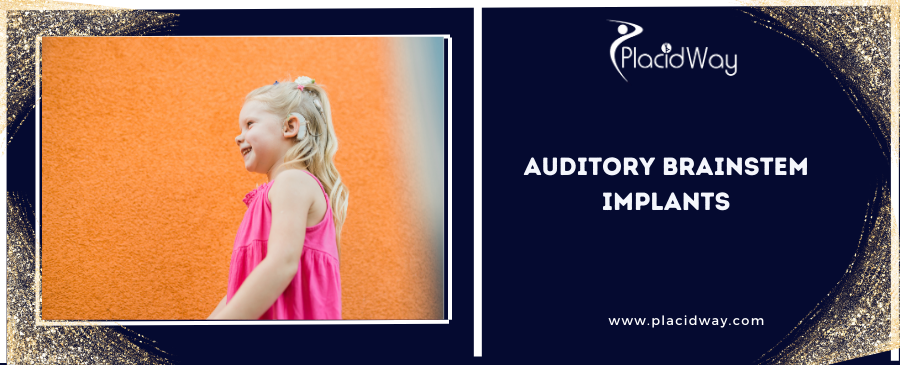
Rediscover the World of Sound: Your Guide to Auditory Brainstem Implants (ABI)
Imagine a world where silence reigns, yet your mind yearns for the simple melodies of life – a loved one's voice, the rustle of leaves, or your favorite song. For many facing profound hearing loss, especially when the vital auditory nerve is compromised, this silent reality can be profoundly isolating. When conventional hearing aids or even cochlear implants aren't an option, the prospect of regaining sound might seem like a distant dream. This is where the remarkable innovation of the Auditory Brainstem Implant (ABI) steps in, offering a pathway to hearing for those who once thought it impossible.
An Auditory Brainstem Implant is a sophisticated medical device designed to help individuals who cannot benefit from cochlear implants because their auditory nerves are severely damaged, non-existent, or have been removed, often due to conditions like Neurofibromatosis Type 2 (NF2). Rather than stimulating the cochlea, an ABI directly stimulates the brainstem, sending electrical signals that the brain can interpret as sound. This groundbreaking procedure can dramatically improve quality of life, opening doors to communication and connection that were previously closed.
If you're exploring options for profound hearing loss and have been told a cochlear implant won't work, understanding the ABI procedure is your next crucial step. This guide will delve deep into what an ABI entails, from the symptoms that suggest its need to the recovery process, potential risks, and importantly, how medical tourism offers an accessible and often more affordable route to this life-changing surgery.
What are the signs and symptoms indicating a need for an Auditory Brainstem Implant?
Recognizing the signs and symptoms that point towards the need for an Auditory Brainstem Implant is crucial for individuals and their families. While profound hearing loss is the overarching symptom, the specific reasons why an ABI might be necessary usually stem from the integrity of the auditory nerve.
- Bilateral Profound Sensorineural Hearing Loss: This is the primary indicator. It means severe to total deafness in both ears, originating from damage to the inner ear (cochlea) or the auditory nerve.
- Non-functional Auditory Nerves: Unlike cochlear implants that require a healthy auditory nerve to transmit signals, ABI candidates often have auditory nerves that are either:
- Severely damaged: Due to trauma, disease, or birth defects.
- Absent: The nerve simply never developed.
- Surgically removed: Most commonly in patients with Neurofibromatosis Type 2 (NF2), a genetic disorder causing tumors (acoustic neuromas or vestibular schwannomas) to grow on the auditory nerves. Removal of these life-threatening tumors often necessitates cutting the auditory nerve.
- Inability to Benefit from Cochlear Implants: If a comprehensive evaluation determines that a cochlear implant would not provide hearing benefit due to the aforementioned auditory nerve issues, an ABI becomes the next consideration.
- Associated Symptoms with NF2: For NF2 patients, prior to tumor removal and subsequent hearing loss, other symptoms might include severe tinnitus (ringing in the ears), balance issues, and sometimes facial weakness or numbness due to nerve compression.
If you or a loved one experiences profound hearing loss and has been diagnosed with conditions affecting the auditory nerve, particularly NF2, discussing the potential of an ABI with a specialist is paramount.
What causes profound hearing loss that an Auditory Brainstem Implant can treat?
The profound hearing loss that an ABI addresses isn't just any hearing loss; it's specifically rooted in the inability of the auditory nerve to transmit sound signals from the inner ear to the brain. Understanding these causes helps clarify why an ABI is a unique and often last-resort solution:
- Neurofibromatosis Type 2 (NF2): This genetic disorder is the most common reason for ABI surgery. NF2 causes benign tumors (vestibular schwannomas or acoustic neuromas) to grow on the nerves, particularly the auditory nerves. When these tumors grow large, they can destroy the auditory nerve or require its surgical removal to save the patient's life or prevent other neurological deficits. Without an auditory nerve, cochlear implants are ineffective.
- Trauma: Severe head injuries or skull base fractures can directly damage the auditory nerve, rendering it non-functional.
- Congenital Malformations: Some individuals are born with an absent or severely underdeveloped auditory nerve (auditory nerve aplasia or hypoplasia). In such cases, the pathway for sound signals is never properly formed.
- Other Tumors or Lesions: While less common than NF2, other non-NF2 tumors or lesions affecting the auditory nerve or brainstem pathway can also lead to severe hearing loss that necessitates an ABI.
- Ossified Cochlea with Damaged Nerve: In some rare cases of cochlear ossification (hardening), combined with auditory nerve damage, an ABI might be considered if a cochlear implant cannot be placed or would be ineffective.
In essence, an ABI is considered when the "wire" (auditory nerve) connecting the ear to the brain's hearing center is broken beyond repair, and the ABI serves as a new, artificial wire.
How does an Auditory Brainstem Implant work, and what are its types?
The Auditory Brainstem Implant operates on a principle different from that of a cochlear implant. Instead of stimulating the cochlea, it targets the part of the brain responsible for processing auditory information.
How it Works:
- External Sound Processor: Worn behind the ear, similar to a hearing aid or cochlear implant processor. It has a microphone that picks up sounds from the environment.
- Signal Processing: The sound processor converts these sounds into digital electrical signals.
- Transmitter Coil: These digital signals are then sent to a transmitter coil, also worn externally, which sits on the scalp over the internal implant.
- Internal Implant: A surgically implanted receiver-stimulator lies just under the skin. It receives the signals from the external coil.
- Electrode Array: The internal implant is connected to an electrode array – a paddle-shaped device with multiple small electrodes. During surgery, this array is carefully placed directly onto the cochlear nucleus, a cluster of nerve cells in the brainstem responsible for processing sound.
- Brainstem Stimulation: The electrodes directly stimulate these nerve cells, sending signals up to the brain's auditory cortex, where they are interpreted as sound.
Types of ABIs:
While the fundamental mechanism of ABIs is similar across manufacturers, advancements continue to refine the technology. Currently, there isn't a widely recognized classification of "types" of ABIs in the same way there are types of hearing aids. Instead, ABIs are primarily differentiated by the manufacturer and the specific design of their electrode array and sound processor. Leading manufacturers include Cochlear Limited and Advanced Bionics, each offering devices with slightly different features in terms of:
- Electrode Array Design: Variations in the shape, number, and configuration of electrodes to optimize brainstem stimulation.
- Sound Processor Technology: Different algorithms for sound processing, connectivity options (e.g., Bluetooth), and external design.
- Surgical Approaches: While the device is consistent, the surgical approach for placement can vary slightly depending on the patient's anatomy and the surgeon's preference.
The goal of all ABIs remains the same: to provide auditory sensation and improve communication for those for whom other options are not viable.
Who is eligible for an Auditory Brainstem Implant, and is it right for me?
Determining eligibility for an Auditory Brainstem Implant is a rigorous process involving a multidisciplinary team of specialists. It's not a decision taken lightly, as the surgery is complex and the outcomes, while life-changing, differ from natural hearing.
Key Eligibility Criteria:
- Age: ABIs are approved for adults and children (typically aged 12 months and older in many regions, though specific guidelines vary by country and implant type).
- Profound Bilateral Sensorineural Hearing Loss: As discussed, severe to total deafness in both ears.
- Non-functional or Absent Auditory Nerves: This is the most critical factor. Candidates must have medical evidence (e.g., MRI scans, auditory evoked potentials) showing that their auditory nerves are incapable of transmitting sound, ruling out cochlear implants. This is most commonly due to:
- Neurofibromatosis Type 2 (NF2): Patients who have had (or will have) acoustic neuromas removed, which often necessitates cutting the auditory nerve.
- Cochlear Aplasia/Hypoplasia with absent auditory nerve.
- Severe inner ear malformations or trauma.
- Good General Health: Candidates must be healthy enough to undergo major skull base surgery, including anesthesia.
- Realistic Expectations: Patients and their families must understand that an ABI provides sound awareness and can significantly aid in lip-reading, but it typically does not restore "normal" hearing. The perception of sound can be different and requires significant rehabilitation.
- Commitment to Rehabilitation: Post-surgical auditory therapy and speech rehabilitation are extensive and crucial for maximizing the benefits of the implant.
Is it right for you? The only way to truly answer this is through a comprehensive evaluation by an experienced otologist, neurosurgeon, audiologist, and speech pathologist. They will assess your medical history, perform detailed audiological and imaging tests, and discuss your communication goals to determine if an ABI is your best path forward.
What is the typical recovery time and what can I expect after an ABI surgery?
Undergoing ABI surgery is a significant step, and understanding the recovery journey is vital for planning and setting realistic expectations. The process doesn't end when you leave the operating room; it's just the beginning of your auditory journey.
Immediate Post-Operative Period (Hospital Stay):
- Duration: Typically 3 to 7 days, depending on individual recovery and hospital protocols.
- Initial Discomfort: You'll likely experience pain, nausea, and dizziness, managed with medication. Headaches are common.
- Incision Care: The surgical incision behind the ear and potentially on the head will need careful management to prevent infection.
- Monitoring: Neurological functions, balance, and general vital signs are closely monitored.
Weeks 1-6 (Healing and Preparation):
- At Home Recovery: You'll continue to recover at home, avoiding strenuous activities and heavy lifting. Swelling and bruising will gradually subside.
- Wound Healing: The surgical site needs to heal completely before the external components can be fitted. This usually takes 4 to 6 weeks.
- No Sound Yet: During this period, the implant is not activated, so there will be no immediate hearing benefit.
Post-Activation and Rehabilitation (Long-Term):
- Activation Day: Approximately 4-6 weeks post-surgery, the external sound processor is fitted and activated by an audiologist. This is often an emotional day, as patients hear sounds for the first time or in a new way.
- Mapping Sessions: The audiologist will "map" the implant, adjusting the stimulation levels of each electrode to optimize sound perception. Multiple mapping sessions are required in the initial months.
- Auditory-Verbal Therapy (AVT) and Aural Rehabilitation: This is the most crucial, and often the longest, part of the recovery. The brain needs to learn to interpret the new electrical signals as meaningful sound. This involves:
- Learning to detect different sounds (environmental sounds, speech).
- Developing sound discrimination and identification.
- Improving speech perception and understanding.
- Working with speech-language pathologists and audiologists to maximize communication skills.
- Gradual Improvement: Hearing with an ABI is a learning process. Improvements are gradual and can continue for many months or even years. Outcomes vary widely; some achieve good speech understanding, while others primarily gain sound awareness to aid lip-reading.
It's important to remember that the journey with an ABI is a marathon, not a sprint. Patience, persistence, and a strong commitment to rehabilitation are key to achieving the best possible results.
What are the potential risks and side effects of an Auditory Brainstem Implant?
Like any major surgical procedure, Auditory Brainstem Implant surgery carries potential risks and side effects. It's essential for prospective patients to be fully informed and discuss these thoroughly with their medical team.
General Surgical Risks (common to most skull base surgeries):
- Infection: At the surgical site or within the brain/meninges (meningitis).
- Bleeding/Hematoma: Excessive bleeding during or after surgery.
- Cerebrospinal Fluid (CSF) Leak: Leakage of fluid surrounding the brain and spinal cord, which can lead to headaches and increase infection risk.
- Anesthesia Complications: Reactions to anesthetic agents, respiratory problems, etc.
- Nerve Damage: While the goal is to improve hearing, there's a risk of damage to nearby cranial nerves (e.g., facial nerve, balance nerves), leading to facial weakness, balance problems, or swallowing difficulties.
- Stroke: A rare but serious complication due to blood vessel manipulation.
ABI-Specific Risks and Side Effects:
- Non-Auditory Sensations: Because the brainstem is densely packed with various nerve nuclei, stimulating the cochlear nucleus can sometimes inadvertently activate adjacent nerves. This can cause:
- Tingling or numbness: In the face or other parts of the head.
- Muscle spasms: In the face, neck, or eye.
- Dizziness or balance disturbances: Affecting mobility and stability.
- Visual disturbances: Such as flashing lights.
- Limited Speech Understanding: While ABIs restore sound awareness, the level of speech understanding varies greatly. It's often less precise than with a cochlear implant. Many ABI users rely on lip-reading combined with sound cues to understand speech.
- Sound Quality: The sound perceived through an ABI can be different from natural hearing – often described as mechanical, robotic, or less rich. The brain needs time to adapt.
- Implant Malfunction or Failure: The internal device can fail due to technical issues, infection, or trauma, requiring revision surgery.
- Device Extrusion: In rare cases, the implant may become exposed through the skin.
- Scarring: A noticeable scar behind the ear and on the scalp.
- MRI Compatibility: Most ABIs are now MRI-compatible, but specific guidelines and precautions (e.g., magnet removal) must be followed.
It's crucial to have open and honest discussions with your surgical team about these risks and how they might apply to your specific situation.
How do Auditory Brainstem Implant costs compare worldwide?
The cost of an Auditory Brainstem Implant is a major factor for many patients, as it is a highly specialized and expensive procedure. These costs typically include the implant device itself, the surgical fees (neurosurgeon, otologist), anesthesia, hospital stay, and initial mapping/activation sessions. Long-term auditory rehabilitation costs are usually separate.
Prices can fluctuate wildly depending on the country, the hospital's reputation, the surgeon's experience, and the specific implant model. Here's a general comparison to illustrate the significant differences:
Auditory Brainstem Implant (ABI) Cost Comparison (Estimated in USD):
| Country | Estimated ABI Cost Range (USD) | Notes |
|---|---|---|
| United States | $100,000 - $180,000+ | High-end costs, often including renowned specialists and state-of-the-art facilities. Insurance coverage varies. |
| United Kingdom | $80,000 - $120,000+ | NHS covers some cases, private costs are substantial. |
| Germany | $70,000 - $110,000+ | Known for high-quality medical care and advanced technology. |
| India | $30,000 - $55,000 | Significantly lower costs, growing medical tourism hub with highly skilled surgeons and modern facilities. |
| Turkey | $35,000 - $60,000 | Competitive pricing, advanced hospitals, and proximity for European patients. |
| Mexico | $40,000 - $70,000 | Popular for North American patients seeking affordable, high-quality care. |
| Thailand | $45,000 - $75,000 | Reputable for medical tourism, excellent facilities, and often comprehensive packages. |
*These are estimated ranges and can change based on individual patient needs, specific implant model, surgeon's fees, and chosen facility. Always obtain a detailed quote from your chosen clinic.
The stark difference in prices often drives patients to consider medical tourism for ABI surgery, allowing them to access life-changing treatment without the prohibitive costs found in their home countries.
Why should I consider an Auditory Brainstem Implant procedure abroad?
For many individuals and families facing profound hearing loss that requires an ABI, the option of undergoing the procedure abroad, often referred to as medical tourism, presents a compelling solution. Here's why:
- Substantial Cost Savings: As seen in the cost comparison, the price difference can be immense. An ABI that costs upwards of $150,000 in the US could be $40,000-$70,000 in countries like India, Turkey, or Mexico. This can make the difference between affording the surgery or not.
- Access to Specialized Expertise: Some countries boast highly experienced neurotologists and neurosurgeons who perform a high volume of ABI surgeries, giving them unparalleled expertise in this complex procedure. Often, these specialists have trained internationally and work in state-of-the-art facilities.
- Reduced Waiting Times: In many Western healthcare systems, waiting lists for specialized surgeries can be long. Traveling abroad often means quicker access to appointments and surgical dates, allowing for faster treatment and recovery.
- Cutting-Edge Technology: Many medical tourism destinations have invested heavily in modern hospitals equipped with the latest diagnostic and surgical technologies, ensuring patients receive care comparable to or exceeding what's available at home.
- Comprehensive Packages: Many international clinics and medical tourism facilitators offer all-inclusive packages that cover surgery, hospital stay, pre- and post-operative consultations, and sometimes even accommodation and local transport, simplifying the travel and treatment process.
- Confidentiality and Privacy: For some, the privacy offered by seeking treatment in another country is a significant benefit.
Choosing to go abroad for an ABI is a deeply personal decision, but for those balancing cost, quality, and accessibility, it offers a viable and often superior alternative.
Which countries offer the best value and quality for Auditory Brainstem Implants?
When seeking an Auditory Brainstem Implant abroad, it's crucial to identify countries that balance high-quality medical care with reasonable costs. Several nations have emerged as leaders in medical tourism, especially for complex procedures like ABI:
- India: Renowned for its world-class hospitals and highly skilled surgeons, many of whom are internationally trained. India offers exceptional value, with state-of-the-art facilities and comprehensive care at a fraction of Western prices. It is a top choice for complex neurological and ENT surgeries.
- Turkey: Positioned at the crossroads of Europe and Asia, Turkey has rapidly developed its medical infrastructure. Its hospitals are modern, often accredited by international bodies, and offer competitive pricing. Surgeons are experienced, and the country is easily accessible for patients from Europe, the Middle East, and North Africa.
- Mexico: A popular choice for North American patients due to its proximity and significantly lower costs. Many Mexican hospitals catering to medical tourists are JCI-accredited (Joint Commission International) and employ US-trained physicians, ensuring high standards of care.
- Thailand: Known for its luxurious private hospitals, excellent patient care, and English-speaking staff, Thailand offers a comfortable and efficient medical tourism experience. While slightly higher in cost than India or Turkey, it still provides substantial savings compared to Western countries.
- Germany: For those prioritizing European standards of clinical excellence and advanced medical research, Germany offers high-quality ABI services. While generally more expensive than Asian or Latin American options, it often provides better value than the US or UK, with leading university hospitals and specialized centers.
When selecting a country and clinic, always look for international accreditations (like JCI), inquire about the surgeon's experience specifically with ABI procedures, and seek transparent pricing that includes all aspects of care.
What should I expect when planning to travel for an ABI procedure overseas?
Planning for an ABI procedure overseas involves more than just booking flights. It requires meticulous organization and foresight to ensure a smooth and successful medical journey:
- Thorough Research: Start by researching potential countries, hospitals, and surgeons. Look for clinics specializing in complex neurological and ENT surgeries, with demonstrable experience in ABIs. Check for international accreditations (e.g., JCI).
- Remote Consultations: Most reputable clinics offer remote consultations (video calls) with their specialists. Be prepared to send your medical records, imaging (MRI/CT scans), and audiology reports for review. This is crucial for determining your eligibility and getting a preliminary treatment plan and quote.
- Visa and Travel Documents: Confirm visa requirements for your chosen country. Ensure your passport is valid for at least six months beyond your planned return. You might need a medical visa letter from the hospital.
- Accommodation and Logistics: Plan for an extended stay, typically 2-4 weeks, to cover pre-op assessments, surgery, and initial post-op recovery. Consider accommodation near the hospital that offers comfort and accessibility. Many medical tourism facilitators (like PlacidWay) can assist with these arrangements.
- Language and Communication: While many international hospitals cater to English-speaking patients, understand the primary language and ensure interpreters are available if needed.
- Financial Planning: Beyond the procedure cost, budget for flights, accommodation, food, local transportation, any unexpected medical needs, and follow-up care.
- Post-Operative Care and Rehabilitation: Discuss the post-operative rehabilitation plan in detail. Will you need to stay in the country for initial mapping and therapy sessions? How will long-term therapy be managed back home?
- Travel Insurance: Obtain comprehensive travel and medical insurance that covers medical emergencies and potential complications while abroad.
- Medical Tourism Facilitator: Consider working with a reputable medical tourism company like PlacidWay. They specialize in coordinating all aspects of your trip, from finding the right clinic and surgeon to arranging travel, accommodation, and managing communication, significantly easing the burden on you and your family.
Preparation is key to a positive medical tourism experience. Don't hesitate to ask your chosen clinic or facilitator every question you have, no matter how small.
Take the Next Step with PlacidWay
Ready to explore treatment options abroad? Discover top clinics, compare prices, and get a free quote tailored to your needs with PlacidWay. We connect you with world-class specialists for Auditory Brainstem Implants and provide comprehensive support for your medical journey.










Share this listing